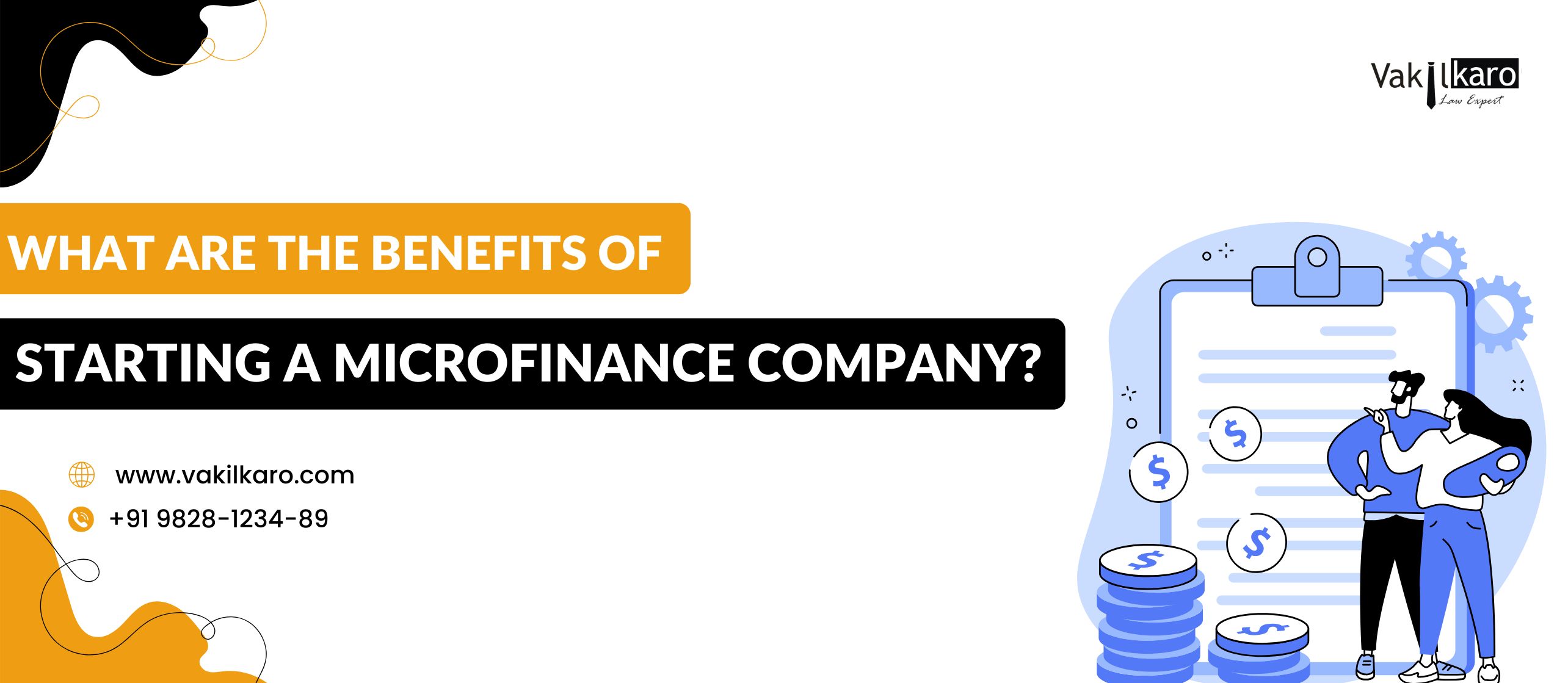Advantages of Starting a Microfinance Company
Starting a microfinance company provides a range of benefits, from promoting financial inclusion to generating high returns on investment. These institutions play a crucial role in offering financial assistance to individuals and small businesses that lack access to conventional banking services. By providing small loans, savings options, and insurance, microfinance companies help uplift economically weaker sections of society, fostering overall economic growth.
One of the key advantages of establishing a microfinance company is the support received from the government and regulatory bodies. Policies promoting microfinance encourage financial inclusion, making it easier for such institutions to access funding and grants. Entrepreneurs can opt for an NBFC-MFI ( Non-Banking Financial Company – Microfinance Institution) or a Section 8 microfinance company registration depending on their business goals and financial capabilities. Understanding the Section 8 microfinance company registration fees is crucial, as this structure allows for tax benefits and reduced compliance burdens for non-profit organizations.
Another significant benefit is the flexibility in loan structures. Unlike traditional banks, microfinance institutions offer small loans without the need for extensive documentation or collateral. This accessibility makes it easier for small entrepreneurs and self-employed individuals to obtain financial support. Additionally, microfinance companies can expand their services to include savings plans, financial literacy programs, and digital banking solutions, enhancing their impact.
Moreover, microfinance institutions enjoy high market demand due to a large unbanked population. With a well-structured business model and effective risk management strategies, they can achieve substantial growth and sustainability. Entrepreneurs must also consider the micro finance company registration fee and other legal requirements to ensure smooth operations. By leveraging technology, government support, and strategic financial planning, microfinance companies can drive social impact while building a profitable and scalable business.

Introduction
Microfinance companies play a crucial role in providing financial services to individuals and small businesses that lack access to traditional banking systems. These companies help in bridging the financial gap by offering microloans, savings options, insurance, and other financial services. Establishing a microfinance company not only contributes to financial inclusion but also offers numerous business advantages. If you are considering entering this sector, understanding the benefits and financial implications, such as Section 8 microfinance company registration fees and micro finance company registration fee, is essential.
Financial Inclusion and Economic Growth
One of the most significant advantages of starting a microfinance company is promoting financial inclusion. Millions of people, particularly in rural areas, do not have access to conventional banking services. Microfinance institutions (MFIs) provide small loans, helping individuals establish or expand their businesses, invest in education, or meet emergency needs. By facilitating financial inclusion, microfinance companies contribute to overall economic development.
High Demand and Market Potential
With a large portion of the population still unbanked or underbanked, the demand for microfinance services continues to grow. Entrepreneurs, small business owners, and farmers seek financial assistance that traditional banks often deny due to a lack of collateral or credit history. As a result, microfinance companies enjoy a substantial customer base and market potential.
Government Support and Favorable Policies
The Indian government actively promotes microfinance institutions as a tool for economic development. There are various incentives and subsidies available for MFIs, especially for those operating under a Section 8 microfinance company registration structure from MCA. Such companies can benefit from tax exemptions, government grants, and reduced compliance requirements compared to other financial institutions.
Low Initial Investment and High ROI
Starting a microfinance company requires relatively low initial capital compared to conventional banks. A Section 8 microfinance company, which operates as a non-profit entity, does not require Reserve Bank of India (RBI) approval, further reducing initial expenses. Entrepreneurs need to be aware of the Section 8 microfinance company registration fees, which are lower compared to other business structures. Despite the lower investment, microfinance companies can generate high returns by offering financial products tailored to their target customers.
Social Impact and Poverty Alleviation
Microfinance institutions play a vital role in reducing poverty by empowering individuals with access to capital. Small loans help people start businesses, improve their livelihoods, and become financially independent. By starting a microfinance company, entrepreneurs contribute to social welfare while also running a profitable enterprise.
Legal Recognition and Credibility
Registering a microfinance company provides legal recognition and credibility in the market. It allows the institution to operate within a regulatory framework, ensuring trust among investors and customers. Whether opting for a Section 8 microfinance company registration or an NBFC-MFI (Non-Banking Financial Company – Microfinance Institution), legal recognition enhances the company’s reputation and facilitates growth.

Easier Fundraising and Investment Opportunities
A legally registered microfinance company has better access to funding sources, including government grants, private investors, and financial institutions. NBFC-MFIs can attract venture capital and private equity funding, while Section 8 companies can receive donations and grants due to their non-profit status. Understanding the micro finance company registration fee and ensuring compliance with legal requirements enhances fundraising opportunities.
Flexible Loan Structures and Diverse Financial Services
Microfinance companies can offer flexible loan structures, catering to different customer needs. Unlike traditional banks, which require collateral and extensive paperwork, microfinance institutions provide hassle-free credit. Additionally, MFIs can expand their services by offering savings accounts, insurance, financial literacy programs, and digital banking solutions.
Technology Integration and Scalability
With the rise of fintech solutions, microfinance companies can leverage technology to streamline operations, reduce costs, and reach a wider audience. Mobile banking, digital payments, and AI-driven credit assessment models enable microfinance institutions to scale efficiently and serve customers more effectively.
Competitive Advantage Over Traditional Banks
Traditional banks often hesitate to lend to low-income individuals due to high risks and operational costs. Microfinance companies, however, specialize in providing small loans with manageable repayment terms, giving them a competitive edge. The ability to offer personalized financial solutions makes microfinance companies more attractive to customers who lack access to mainstream banking.
Relevance of Section 8 Microfinance Company Registration
A Section 8 microfinance company registration is highly relevant for organizations aiming to promote financial inclusion while operating as a non-profit entity. Registered under the Companies Act, 2013, a Section 8 microfinance company is structured to provide small loans, savings options, and financial literacy programs to economically weaker sections. Unlike NBFC-MFIs, these companies do not require RBI approval, making the registration process simpler and more cost-effective.
One of the key reasons for choosing a Section 8 microfinance company registration is the tax benefits it offers. Since these companies operate as non-profits, they qualify for various exemptions under the Income Tax Act, helping reduce operational costs. Additionally, they are eligible for government grants and CSR (Corporate Social Responsibility) funding, allowing them to expand their reach and services.
Another crucial aspect is the ability to serve marginalized communities without the burden of stringent capital requirements. Unlike NBFC-MFIs, which require a minimum capital of ₹5 crores, Section 8 companies have minimal financial constraints, making them a viable option for social entrepreneurs. With growing demand for microfinance solutions, registering under Section 8 allows organizations to contribute to economic empowerment while ensuring compliance with legal and regulatory frameworks.
Relevance of Section 8 Microfinance Company Registration
A Section 8 microfinance company registration is highly relevant for organizations aiming to promote financial inclusion while operating as a non-profit entity. Registered under the MCA, a Section 8 microfinance company is structured to provide small loans, savings options, and financial literacy programs to economically weaker sections. Unlike NBFC-MFIs, these companies do not require RBI approval, making the registration process simpler and more cost-effective.
One of the key reasons for choosing a Section 8 microfinance company registration is the tax benefits it offers. Since these companies operate as non-profits, they qualify for various exemptions under the Income Tax Act, helping reduce operational costs. Additionally, they are eligible for government grants and CSR (Corporate Social Responsibility) funding, allowing them to expand their reach and services.
Another crucial aspect is the ability to serve marginalized communities without the burden of stringent capital requirements. Unlike NBFC-MFIs, which require a minimum capital of ₹5 crores, Section 8 companies have minimal financial constraints, making them a viable option for social entrepreneurs. With growing demand for microfinance solutions, registering under Section 8 allows organizations to contribute to economic empowerment while ensuring compliance with legal and regulatory frameworks.
Conclusion
Starting a microfinance company in India presents numerous benefits, ranging from financial inclusion and economic growth to profitability and legal credibility. Entrepreneurs must carefully consider the micro finance company registration fee and other compliance requirements to ensure smooth operations. Whether opting for a Section 8 microfinance company registration or an NBFC-MFI, the opportunities for growth and social impact make microfinance a rewarding sector. By leveraging government support, technology, and strategic financial planning, microfinance companies can build sustainable businesses while transforming lives.
Why Choose Vakilkaro for Microfinance Company Registration and Related Services?
Vakilkaro is a trusted legal and financial service provider specializing in microfinance company registration, ensuring a smooth and hassle-free setup process. Whether you are looking to establish an NBFC-MFI or a Section 8 microfinance company, Vakilkaro offers expert guidance at every step, from documentation to compliance with regulatory authorities like the RBI and MCA.
One of the key reasons to choose Vakilkaro is its transparent and cost-effective approach. Understanding the complexities of Section 8 microfinance company registration fees and micro finance company registration fee is essential for a successful registration, and Vakilkaro provides clear insights into all financial aspects. Their team ensures compliance with legal requirements, helping businesses avoid penalties or delays.
Additionally, Vakilkaro offers post-registration support, including tax advisory, bookkeeping, and compliance management, ensuring your microfinance company remains operationally efficient. With a client-centric approach, they also assist in obtaining government approvals, funding opportunities, and legal structuring.
For entrepreneurs looking to apply for a microfinance company registration with ease, Vakilkaro’s expertise in handling regulatory frameworks makes them a reliable partner. Their tailored solutions and professional support streamline the entire process, allowing businesses to focus on financial inclusion and sustainable growth.